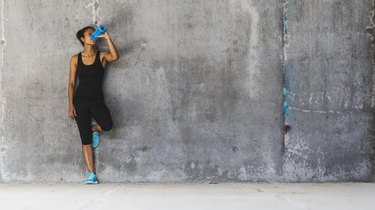
Water makes up more than 60 percent of your body weight, and staying hydrated supports important functions such as maintaining body temperature, removing waste and lubricating your joints.
When you become dehydrated, whether from illness or playing sports for long periods, you need to drink enough water to replenish your body's stores. But you want to avoid drinking too much water, which can have health consequences, too.
Video of the Day
Video of the Day
Tip
Water is your best bet for fighting dehydration, but to prevent complications, drink to your thirst. Don't overdrink.
Details of Dehydration
Your body loses fluids through sweat, urine and other bodily excretions, such as vomit and diarrhea. It's easy to become dehydrated when you sweat a lot during physical activity, especially if you exercise for a long time in hot weather. If you've been sick and have been vomiting or experiencing diarrhea, you may also become dehydrated.
Symptoms of dehydration include thirst; a dry, sticky mouth; decreased urine and urine that is dark in color; headache; and muscle cramps. Severe dehydration may cause confusion, irritability, rapid heartbeat and even loss of consciousness.
Too Much Water
When rehydrating yourself, you want to be careful not to drink too much water. This can dilute the concentration of sodium in the blood, a condition called hyponatremia. When this happens, the balance of sodium in the fluids outside your body's cells is disrupted, fluid moves into the cells in an attempt to fix the imbalance and your cells swell.
Brains cells are particularly prone to swelling. Symptoms of hyponatremia include confusion, convulsions, fatigue, loss of appetite, irritability and even death.
Read more: Is Alkaline Water Extra Healthy or a Hoax?
The Real Reason
It's rare for hyponatremia to result from drinking too much water alone. Rather, it results from excess fluid intake combined with increased secretion of your antidiuretic hormones, according to a December 2013 case report published in Case Reports in Nephrology and Urology.
Secretion of this hormone rises during times of physical stress, such as endurance competitions, and causes the body to hold onto water. If you're also drinking lots of fluids, this may cause the dangerous effects associated with hyponatremia.
Water to the Rescue
Mild to moderate dehydration can be treated by simply drinking water — but not too much. According to MedlinePlus, if you catch the signs of dehydration early and treat it, you can recover with no problems.
After a long bout of exercise, if you feel very thirsty or notice any other mild to moderate symptoms, begin sipping water to rehydrate. Drinking to satisfy your thirst is the best way to ensure you get an adequate amount of fluids, but not too much. You'll know your water levels are back to normal when your urine is pale in color.
Basic Fluid Needs
How much water you need to drink each day to prevent dehydration depends on a number of factors, including your activity, the weather outside, your gender and your overall health. In general, according to the Mayo Clinic, women need 11.5 cups of fluids a day, while men need 15.5 cups. That doesn't all have to come from water. In fact, about 20 percent of your daily fluids comes from the food you eat.
- American Academy of Family Physicians: "Hydration: Why It’s So Important"
- MedlinePlus: "Dehydration"
- MedlinePlus: "Fluid and Electrolyte Balance"
- MedlinePlus: "Hyponatremia"
- Case Reports in Nephrology and Urology: "A Case of Water Intoxication With Prolonged Hyponatremia Caused by Excessive Water Drinking and Secondary SIADH"
- Mayo Clinic: "Water: How Much Should You Drink Every Day?"
Was this article helpful?
150 Characters Max
0/150
Thank you for sharing!
Thank you for your feedback!